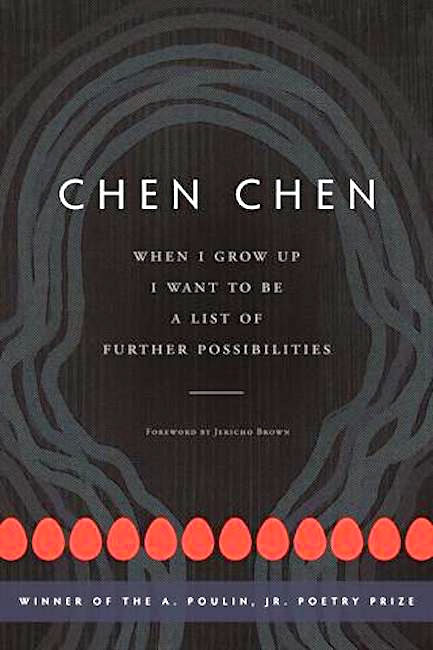… also gifted, and a poet. That would be Chen Chen, who I became acquainted with through Matthew Zapruder’s poetry column in the NYT Magazine on March 5th, which featured the first poem (“Self-Portrait as So Much Potential”) in Chen’s debut collection When I Grow Up I Want to Be a List of Further Possibilities. The poet as a grown-up, in a rose garden (in a photo by his partner, Jeff Gilbert):
[On the title of this posting: a play on “To Be Young, Gifted and Black”. From Wikipedia on the song:
“To Be Young, Gifted and Black” is a song by Nina Simone with lyrics by Weldon Irvine. It was written in memory of Simone’s late friend Lorraine Hansberry, author of the play A Raisin in the Sun, who had died in 1965 aged 34. The song was originally recorded and released by Simone in 1969, also featuring on her 1970 album Black Gold, and was a Civil Rights Movement anthem.
And from Wikipedia on the play and book:
To Be Young, Gifted and Black: Lorraine Hansberry in her Own Words was written by Lorraine Hansberry, an American writer best known for her 1957 play A Raisin in the Sun, a play that made Hansberry the first black author of a show on Broadway. After her death in 1965, Hansberry’s ex-husband and friend, songwriter and poet Robert Nemiroff, collated her unpublished writings and adapted them into a stage play that first ran from 1968 to 1969 off Broadway. It was then converted into an equally successful autobiography with the same title.]
But on to Chen’s poem. Zapruder’s intro:
In his debut collection, the poet Chen Chen writes from a position of colliding identities: Chinese, American, gay. He has said his poems are “a way for those different experiences to come together, for them to be in the same room.” Here, the poet uses metaphor to investigate his own hopes and familial disappointments. The poem has the feeling of genuine, uneasy discovery, as if only through writing could he come to know who he is and what he feels.
(#2)
(Illustration by R.O. Blechman)
Self-Portrait as So Much Potential
Dreaming of one day being as fearless as a mango.
As friendly as a tomato. Merciless to chin & shirtfront.
Realizing I hate the word “sip.”
But that’s all I do.
I drink. So slowly.
& say I’m tasting it. When I’m just bad at taking in liquid.
I’m no mango or tomato. I’m a rusty yawn in a rumored year. I’m an arctic attic.
Come amble & ampersand in the slippery polar clutter.
I am not the heterosexual neat freak my mother raised me to be.
I am a gay sipper, & my mother has placed what’s left of her hope on my brothers.
She wants them to gulp up the world, spit out solid degrees, responsible
grandchildren ready to gobble.They will be better than mangoes, my brothers.
Though I have trouble imagining what that could be.
Flying mangoes, perhaps. Flying mango-tomato hybrids. Beautiful sons.
The book, now in print:
I then discovered a 4/4/16 PBS NewsHour interview with Chen by Corinne Segal, “Chinese, American and gay”:
The word “stanza” means one thing when it refers to a poem: a snippet of text, a line or several. In Italian, it means “room.”
Poet Chen Chen combines those definitions when he writes, thinking: what should be in the room of this poem?
In his earlier work, he began to answer that question with pieces that explored his own intersecting identities, parts of himself that other people told him could not exist at once.
“I felt like I couldn’t be Chinese and American and gay all at the same time. I felt like the world I was in was telling me that these had to be very separate things,” he said. “Poems were a way for those different experiences to come together, for them to be in the same room.”
At the same time, he was reading Li-Young Lee, Mark Doty and others whose work drew him with its personal intensity. “There was just this emotional intensity and honesty to their work that I was really drawn to as a teenager, and as someone who was struggling with my sexuality and thinking about identity in all sorts of ways — with immigrant parents, thinking about how to come out,” he said.
In his work, Chen said he considers the spectrum of voices, experiences or types of diction that fit within the space of one poem. Expressing that range is important to his work, he said.
“I think about, what am I allowing into this poem? What belongs here in the space of the poem? In the room of the poem what is being left out or denied?” he said. “It’s this way to have different voices or people or experiences fit together in the poem, sometimes in an uncomfortable way, but in a necessary way.”
His poem “How I Became Sagacious” revisits the night that Chen’s parents confronted him about his sexuality after overhearing a phone call with a friend. The poem juxtaposes a traditional, lyrical voice with conversational elements and abstract images to build a dreamlike retelling of the night.
This combination was unexpected, Chen said. “It surprised me as I was writing it,” he said.
Background information:
[Chen was born in Xiamen, China, and grew up in Massachusetts.] His work has previously appeared in two chapbooks and publications such as Poetry, The Massachusetts Review, Best of the Net, and The Best American Poetry. He holds an MFA from Syracuse University and is currently pursuing a PhD in English and Creative Writing at Texas Tech University. He lives in Lubbock, Texas with his partner, Jeff Gilbert. Visit him at chenchenwrites.com.
The poem:



Leave a Reply